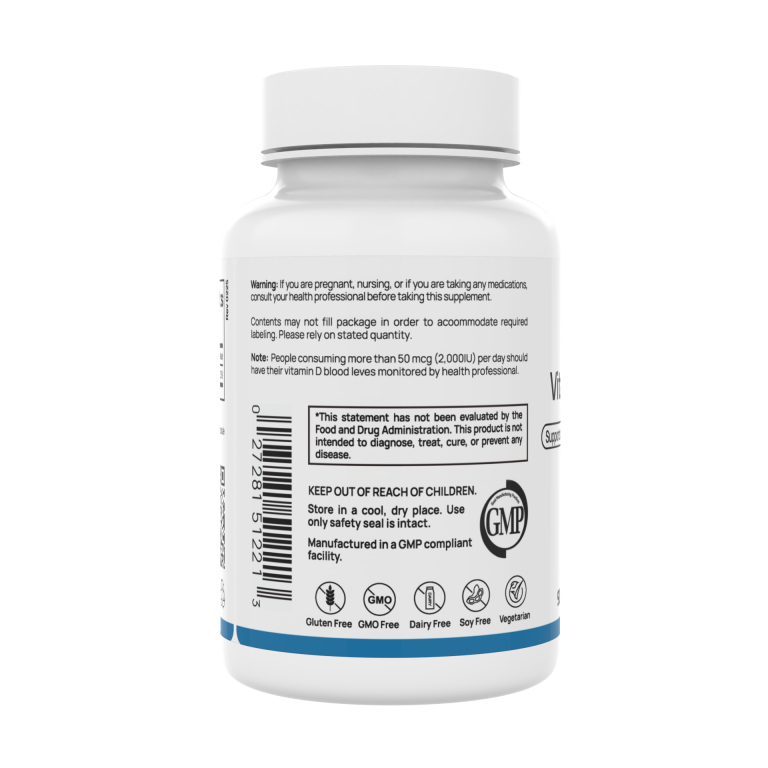



Vitamin D is a steroid vitamin, a group of fat-soluble pro-hormones that are best known for the role they play in supporting bone health and aiding in the absorption of calcium and phosphate from the gastrointestinal tract. However, a growing body of research highlights its important role in supporting other body systems, including cardiovascular and blood sugar balance as well as increasing musculoskeletal strength, neurological and immune function enabled by its ability to target over 200 different genes throughout the body. At the same time, deficiency and insufficiency of this important nutrient has reached epidemic proportions around the world, making the achievement of optimal levels extremely important to overall health.
Known as the sunshine vitamin, one of the key roles of vitamin D is maintaining serum calcium and phosphorous balance. The body makes vitamin D by converting vitamin D2 to D3, or cholecalciferol, when the skin is exposed to sunlight. Vitamin D supplements come in two forms, D2 and D3. Studies have found vitamin D3 is the preferable form, as it has been found to maintain active vitamin D levels for a longer period of time.
1. Wamberg L, Pedersen SB, Richelsen B, Rejnmark L. The effect of high-dose vitamin d supplementation on calciotropic hormones and bone mineral density in obese subjects with low levels of circulating 25-hydroxyvitamin d: results from a randomized controlled study. Calcif Tissue Int. 2013 Jul;93(1):69-77.
2. Cauley JA, Lacroix AZ, Wu L, Horwitz M, Danielson ME, Bauer DC, Lee JS, Jackson RD, Robbins JA, Wu C, Stanczyk FZ, LeBoff MS, Wactawski-Wende J, Sarto G, Ockene J, Cummings SR. Serum 25-hydroxyvitamin D concentrations and risk for hip fractures. Ann Intern Med.2008 Aug 19;149(4):242-50.
3. Wang C. J Diabetes Res. Role of vitamin D in cardiometabolic diseases. 2013;2013:243934. Epub 2013 Feb 25.
4. Zittermann A, Koerfer R. Vitamin D in the prevention and treatment of coronary heart disease. Curr Opin Clin Nutr Metab Care. 2008 Nov;11(6):752-7.
5. Oz F, Cizgici AY, Oflaz H, Elitok A, Karaayvaz EB, Mercanoglu F, Bugra Z, Omer B, Adalet K, Oncul A. Impact of vitamin D insufficiency on the epicardial coronary flow velocity and endothelial function. Coron Artery Dis. 2013 May 20.
6. Ng LL, Sandhu JK, Squire IB, Davies JE, Jones DJ. Vitamin D and prognosis in acute myocardial infarction.Int J Cardiol. 2013 Feb 13.
7. Martini, L.A. and Wood, R.J. Vitamin D and blood pressure connection: update on epidemiologic, clinical, and mechanistic evidence. Nutr Rev. 2008; 66(5):291-297.
8. Teegarden D, Donkin SS. Vitamin D: emerging new roles in insulin sensitivity. Nutr Res Rev. 2009 Jun;22(1):82-92.
9. Chiu KC, Chu A, Go VL, Saad MF. Hypovitaminosis D is associated with insulin resistance and beta cell dysfunction. Am J Clin Nutr. 2004 May;79(5):820-5.
10. Hossein-nezhad A, Spira A, Holick MF. Influence of vitamin D status and vitamin D3 supplementation on genome wide expression of white blood cells: a randomized double-blind clinical trial. PLoS One. 2013;8(3):e58725.
11. Cannell JJ, Vieth R, Umhau JC, Holick MF, Grant WB, Madronich S, Garland CF, Giovannucci E. Epidemic influenza and vitamin D. Epidemiol Infect. 2006 Dec;134(6):1129-40.
12. Abbasi M, Hashemipour S, Hajmanuchehri F, Kazemifar AM. Is vitamin D deficiency associated with non-specific musculoskeletal pain? Glob J Health Sci. 2012 Nov 11;5(1):107-11.
13. Laslett LL, Quinn S, Burgess JR, Parameswaran V, Winzenberg TM, Jones G, Ding C. Moderate vitamin D deficiency is associated with changes in knee and hip pain in older adults: a 5-year longitudinal study. Ann Rheum Dis. 2013 Apr 17.